九年级英语unit3讲解与练习
人教版九年级英语上册unit3--4基础知识复习及训练(含答案)

unit3基础知识复习及训练(含答案)基础知识点复习Unit 3 Could you please tell me where the restrooms are?一.重点短语1. turn left/right 向左/右转2. on one‟ s left/right 在某人的左/右边3. go along Main Street 沿着主大街走4. beside the bank 在银行附近5. between....and... 在.......和.......之间6. go to the third floor 去三楼7. pass by=go past 路过,经过8. how to use the right (proper) language 9. be special about.. . 有……独特之处 10. pardon me 请再说一次11. come on 过来;加油12. one one’ s way to... 在去.......的路上13. something to eat一些吃的东西 14. hold one‟ s hand 抓住某人的手15. mail(send) a letter 寄信16. spend time leading in to a request花时间导入一个请求17. in the shopping center 在购物中心 18. any other....其他任何一个...19. in different situations 在不同情况下 20. park one‟ s car 停车21. an underground parking lot地下停车库 22. such as 例如23. thank sb. for doing sth. 为…感谢某人24. look forward to (doing)…期盼…25. meet sb. for the first time 第一次见到某人26. No problem.没问题。
九年级英语 Unit 3 Teenagers should be allowed to choose their own clothes. 讲解与练习

第 1 页 (共4 页) 第 2 页 (共4 页)学校 姓名 班级 考场 考号---------------------------------○密------------------ -------------------○封----------------------------- -- --○线----------------------------※※※※※※※※※※※※※※※答※※※※※※※※※※※※※※※※※※题※※※※※※※※※※※※※※※※线※※※※※※※※※※※※※九年级英语 Unit 3: Teenagers should be allowed tochoose their own clothes. 讲解与练习重点短语take the test 参加考试 pass the test 通过考试 fail a test 考试失败be strict with+人 对某人严格be strict in+事物 对某事要求严格stay up 熬夜have an opportunity to do sth.有机会做某事=have a chance to do/ of doing every other day 每隔一天 (每两天)clean up 打扫 整理learn from each other 互相学习concentrate on 专注于 one’s own 某人自己的the other day 前几天,几天前 = a few days ago= every two days at present 现在,目前 in this way 用这种方法in the way 挡道的,妨碍人的on the way 在路上 on one’s way to 在某人去…的路上 by the way 顺便说(问)be serious about 对…认真care for 在乎、关心 【语言点】1. Teenagers should be allowed to choose their own clothes.应该允许青少年选择自己的衣服。
英语教材解读人教九年级上册unit3宾语从句专项讲解及练习

He said
1) he__w_o_u_l_d_g_o_ to Hong Kong .
2) he__w__a_s___ sick.
3) he__w_a_s__re_a_d_i_n_g a book .
4) he__h_a_d__fi_n_is_h_e_d_ his work.
2.当主句是一般过去时的时候,宾语从句必须运用相 应的过去的某一种时态。
D. if
2. -I don't know _____ Mr. Green will come to see us.
-He will help us with our English.
A. why
B. when
C. how
D. where
3. -We never know _____ the old man is. -They say he is a teacher. A. what B. who C. which D. where
3. 从句是特殊疑问句 原句中特殊疑问词(wh-,how)
Where are the classrooms? Could you tell me? Could you tell me where the classrooms are?
填入合适的连接词
1. He is good at playing the piano. I think. I think ___th_a_t_ he is good at playing the piano.
4. -Do you know _____ ? I'm going to see him.
-Sorry, I don't know.
A. where does Mr. Li live B. where did Mr. Li live
新人教版九年级英语第三单元知识点讲解与练习含答案
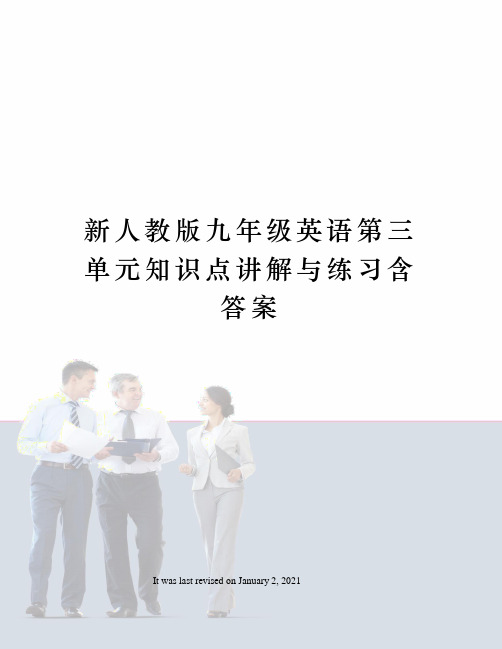
新人教版九年级英语第三单元知识点讲解与练习含答案It was last revised on January 2, 2021九年级英语U n i t31.语态:①英语有两种语态:主动语态和补动语态主动语态表示是动作的执行者被动语态表示主语是动作的承受者Cats eat fish. (主动语态)猫吃鱼。
Fish is eaten by cats.(被动语态)鱼被猫吃。
②被动语态的构成由“助动词be +及物动词的过去分词”构成助动词be 有人称、数和时态的变化,其变化规则与be 作为连系动词时完全一样。
时态被动语态结构例句一般现在时amare +过去分词isEnglish is spoken in manycountries.一般过去时was +过去分词were + 过去分词This bridge was built in1989.情态动词can/shouldmay +be+过去分词must/……The work must be doneright now.③被动语态的用法当我们不知道谁是动作的执行者,或者没有必要指出谁是动作的执行者,或者只需强调动作的承受者时,要用被动语态。
2. allow sb. to do sth. 允许某人做某事(主动语态)如:Mother allows me to watch TV every night. 妈妈允许我每晚看电视。
be allowed to do sth.被允许做某事(被动语态)如:LiLy is allowed to go to Qinzhou. 莉莉被允许去钦州。
3. get their ears pierced 穿耳洞让/使(别人)做某事 get sth. done(过去分词)have sth. done如:I get my car made. == I have my car made. 我让别人修好我的车4. enough 足够形容词+enough如:beautiful enough足够漂亮enough+名词如:enough food 足够食物enoughto 足够…去做…如:I have enough money to go to Beijing. 我有足够的钱去北京。
九年级人教版英语unit3知识点讲解
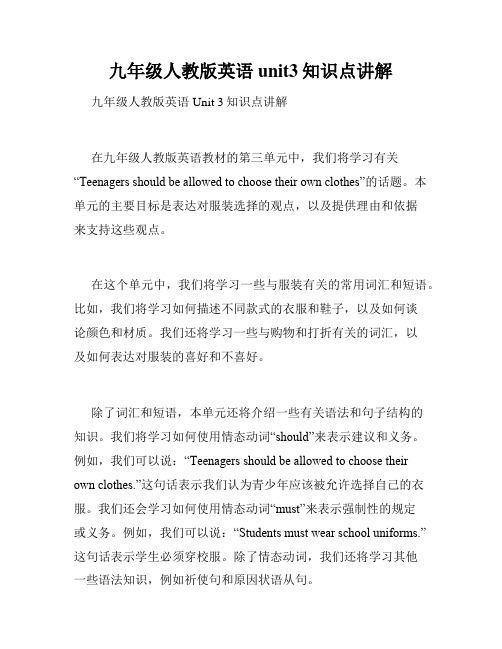
九年级人教版英语unit3知识点讲解九年级人教版英语Unit 3知识点讲解在九年级人教版英语教材的第三单元中,我们将学习有关“Teenagers should be allowed to choose their own clothes”的话题。
本单元的主要目标是表达对服装选择的观点,以及提供理由和依据来支持这些观点。
在这个单元中,我们将学习一些与服装有关的常用词汇和短语。
比如,我们将学习如何描述不同款式的衣服和鞋子,以及如何谈论颜色和材质。
我们还将学习一些与购物和打折有关的词汇,以及如何表达对服装的喜好和不喜好。
除了词汇和短语,本单元还将介绍一些有关语法和句子结构的知识。
我们将学习如何使用情态动词“should”来表示建议和义务。
例如,我们可以说:“Teenagers should be allowed to choose their own clothes.”这句话表示我们认为青少年应该被允许选择自己的衣服。
我们还会学习如何使用情态动词“must”来表示强制性的规定或义务。
例如,我们可以说:“Students must wear school uniforms.”这句话表示学生必须穿校服。
除了情态动词,我们还将学习其他一些语法知识,例如祈使句和原因状语从句。
在本单元中,我们也将学习如何进行听力和口语练习。
我们将听一些关于服装和购物的对话和短文,并回答一些与之相关的问题。
这将有助于提高我们的听力技巧和口语表达能力。
此外,我们还将进行一些角色扮演的练习,扮演不同的角色来表达对服装选择的观点。
学习这个话题不仅可以帮助我们扩展词汇和语法知识,还可以促进我们思考和表达个人观点的能力。
通过探讨服装选择的问题,我们可以思考为什么有些人喜欢流行的衣服,而另一些人喜欢传统的款式。
我们可以讨论服装与个人身份和社会观念之间的关系。
此外,我们还可以思考为什么学校有着对学生着装的规定,以及这些规定背后的原因。
总之,九年级人教版英语教材的第三单元提供了丰富的词汇、语法和口语练习,以及引发思考和讨论的话题。
人教版英语九年级Unit 3 重点知识归纳及讲解

九年级上Unit 3知识清单Section A一、重点短语1. get some magazines/stamps买些杂志/邮票2. a pair of shoes 一双鞋3. ask for the information about the town 询问关于这个小镇的消息4. pass (by) a bookstore = go past/by a bookstore 走过一家书店5.beside the back = next to/ at the side of the bank 在银行旁边6. go to the second floor 去二楼7. get some postcards 买一些卡片8. try the rides 尝试些乘骑项目9. go on sth继续某事10.be excited to do sth兴奋地做某事be excited about sth/doing sth.11. start with = begin with 以...开始end with 以…结束12. hold my hand 抓住我的手13. come on 加油;得了吧14. walk up to 走向15. go east along 沿着…(向东)走16. on one’s way to sp在去某地的路上17. get angry 饿了18. at the door 在门口19. mail a letter 寄封信20. the Italian restaurant nearby 附近的意大利餐馆二、重点句型1. I was scared first, but shouting did help. 该句话中, “did”的用法是助动词表强调,起加强语气的作用。
同类例句如:I’m not joking, we did go camping last weekend. The summer holiday does start next Monday.2. 英语常见问路/指路表达方式:1) 问路Excuse me/Pardon me, where is the nearest post office?Excuse me, which is the way to the nearest post office?Excuse me/Pardon me, can/could you (please) tell me the way to the post office?Excuse me/Pardon me, how can I get to the nearest post office?Could you please possibly tell me how to get to the library?Excuse me/Pardon me, do you know if there’s a post office around here?Would you please tell me if there is a bank nearby?I wonder +…可加以上所有句型。
九年级英语人教版全一册_山西省太原市人教版九年级英语Unit3复习和练习
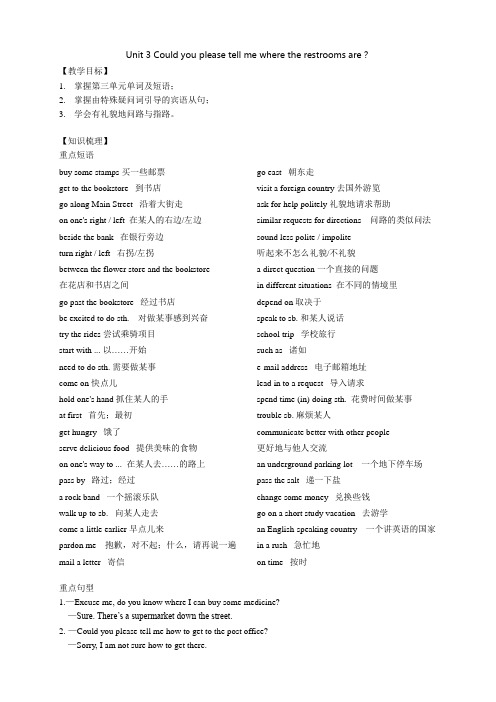
Unit 3 Could you please tell me where the restrooms are?【教学目标】1.掌握第三单元单词及短语;2.掌握由特殊疑问词引导的宾语从句;3.学会有礼貌地问路与指路。
【知识梳理】重点短语buy some stamps 买一些邮票get to the bookstore 到书店go along Main Street 沿着大街走on one's right / left 在某人的右边/左边beside the bank 在银行旁边turn right / left 右拐/左拐between the flower store and the bookstore在花店和书店之间go past the bookstore 经过书店be excited to do sth. 对做某事感到兴奋try the rides 尝试乘骑项目start with ... 以……开始need to do sth. 需要做某事come on 快点儿hold one's hand 抓住某人的手at first 首先;最初get hungry 饿了serve delicious food 提供美味的食物on one's way to ... 在某人去……的路上pass by 路过;经过a rock band 一个摇滚乐队walk up to sb. 向某人走去come a little earlier 早点儿来pardon me 抱歉,对不起;什么,请再说一遍mail a letter 寄信go east 朝东走visit a foreign country 去国外游览ask for help politely 礼貌地请求帮助similar requests for directions 问路的类似问法sound less polite / impolite听起来不怎么礼貌/不礼貌a direct question 一个直接的问题in different situations 在不同的情境里depend on 取决于speak to sb. 和某人说话school trip 学校旅行such as 诸如e-mail address 电子邮箱地址lead in to a request 导入请求spend time (in) doing sth. 花费时间做某事trouble sb. 麻烦某人communicate better with other people更好地与他人交流an underground parking lot 一个地下停车场pass the salt 递一下盐change some money 兑换些钱go on a short study vacation 去游学an English-speaking country 一个讲英语的国家in a rush 急忙地on time 按时重点句型1.—Excuse me, do you know where I can buy some medicine?—Sure. There’s a supermarket down the street. 2.—Could you please tell me how to get to the post office?—Sorry, I am not sure how to get there.3.—Can you tell us when the band starts playing this evening?—It starts at 8:00 p.m.4.—I wonder where we should go.—You should try that new ride over there.问路的常用英语表达:1.Excuse me, can you tell me where the railway station is?打扰一下,请问火车站在哪儿?2.Excuse me, but can you tell me the way to the train station?劳驾,请问去火车站怎么走?3.Excuse me, could you tell me which is the way to the nearest hospital?劳驾,请问去最近的医院怎么走?4.Excuse me, would you please show me the way to the post office?请告诉我去邮局怎么走好吗?5.Excuse me, would you mind telling me the way to the police station?劳驾,请告诉我去警察局怎么走好吗?6.Excuse me, how can I get to No. 1 Middle School?劳驾,请问去一中怎么走?7.Excuse me, is this the right way to the People’s Park?打扰了,请问去人民公园走这条路对吗?8.Excuse me. Could you tell me if there is a Qiaotou Middle School near here?打扰了,请问桥头中学是否在这附近?9. Excuse me. Do you know how I can get to Qiaotou Middle School?= Excuse me. Do you know how to get to Qiaotou Middle School?请问,你知道怎样去桥头中学吗?指路的常用英语表达:1.Go along this street, and …is o n your left.2.Go down this way, and turn left at the first crossing, and you’ll find …is right there, on your left.3.…is behind (near, next to, on the left of) …4.You can just take No. 111 bus, and get off at the second station. And you’ll see it.5.Look! …is in front of us far away, right there!注意:1.问路时应首先说一声:“Excuse me.”这样可以引起对方的注意,又不失礼貌。
Unit3重点知识讲解与练习人教版新目标英语九年级全一册

人教版新目标九年级英语Unit3 Could you please tell me where the restrooms are?重点知识讲解与练习I.词组1. a pair of 一双/一条/一副…2.get to…到达…3.be able to +v 能够做某事4.how about/what about (询问对方情况)…怎么样?5.at first 开始;起初6. a staff person 职员;工作人员7.at that time 那时候8. one /one’ s way to... 在去.......的路上9. something to eat吃的东西10. pass by=go past 路过,经过11. in different situations 在不同情况下12. some+单数可数名词某一…13.. between....and... 在.......和.......之间14.. such as 例如,诸如15.. thank sb. for (doing)sth. 感谢某人做谋事16. look forward to+Ving…期盼做谋事…17. for the first time 第一次18. start/ begin with从/…开始19.ask for information 寻求信息20. at the corner of 在.......的角落21.on/at the corner 在拐角处22..on time 准时按时23..lead into 导入引入24.each other 相互25.cver there 那儿26 .walk up to 朝.....走去27.would like//want . 想要….28 .ask/ (sb.) about sth. 询问(某人)某事的情况municate …with…. 与…联系/沟通30.. an underground parking lot地下停车场二.重点句型\语法1..Could you please…? “请你……好吗?”. 表示有礼貌的提出请求,后接动词原形。
UNIT3第3课时GRAMMAR(知识精讲分层练习)(教师版)九年级下学期英语讲义(牛津译林版)

Unit 3 Robots 课时 3 Grammar影目标导航重点词组」I. own a robot 2.consider the robot a great help in my daily life 3.go on a business trip4. have a serious heart problem5.have to take medicine every day6.have a poor memory7.remind you to take pills at the right time8.feel lonely9.lock the door lO.Go up and down thestairs o 11 ,have a better sleep 重点句型1. He saw that the robot was making breakfast. He saw the robot making breakfast.2. He (bund that his flat was in a complete mess.He found his flat in a complete mess.3. The robot no longer knew when it should cook breakfast.The robot no longer knew when to cook breakfast.4. Mr Jiang did not know what he should do with the robot.Mr Jiang did not know what to do with the robot.5. Mr Jiang is always so busy that he does not have any time for hobbies. Mr john is always too busy to have any time tbr hobbies.6. The robot is so smart that it can do a lot of things. The robot is smart enough to do a lot of things.7. Mr Jiang plans to buy a robot so that he can have more free time.Mr Jiang plans to buy a robot in order to have more free (ime<>♦知识点睛©consider ...as 把…看做 常用被动结构be considered as...? “被认为/看做”?Purple is considered as the noblest color.紫色被认为是最高贵的颜色。
秋季九年级英语全册 unit 3 could you please tell me where

Unit 3 Could you please tell me where the restrooms are?课文重难点讲解与练习重点词汇:stamp rush, suggest, mail, convenient, politely, polite, impolite, request, direction, correct, speaker短语:1. excuse me 劳驾,请原谅,打搅2. get to 到达3. get some magazines 得到一些杂志4. have dinner 吃晚餐5. get some information about 获取有关…….的一些信息6. a pair of 一双,一对,一副7. on one’s / the right 在右边8. turn left / right 向左 / 右拐9. between…..and….. 在…..和…..之间10. go past 经过,路过11. come on 快点儿,过来,加油12. on one’s way to 在某人去…….的路上13. a little earlier 早点儿14. the shopping center 购物中心15. a good place to eat 一个吃饭的好地方16. the corner of …….的角落 / 拐角处17. in different situations 在不同的情况下18. lead in to 导入,引入19. on time 准时,按时20. look forward to 盼望,期待21. pardon me 什么,请再说一遍固定短语:1. not…..until……直到…..才……2. Let’s do sth. 让我们做某事吧3. start doing sth. 开始做某事4. spend time doing sth. 花费时间做某事5. thank sb. for (doing) sth. 为(做)某事而感谢某人6. would like to do sth. 想要做某事7. look forward to doing sth. 盼望,期待做某事重点句型:1.Excuse me, could you please tell me how to get to the bookstore? 打扰一下,请你告诉我如何去书店好吗?2. Excuse me, do you know where I can get some postcards? 请问,你知道在哪里可以买到一些明信片吗?3. I wonder where we should go next. 我想知道接下来我们应该去哪儿?知识点辨析:Section A1. get a dictionary 得到一本字典get 获得,得到 get sb.sth. = get sth for sb. 给某人拿来某物。
人教版九年级英语Unit3单元练习含答案
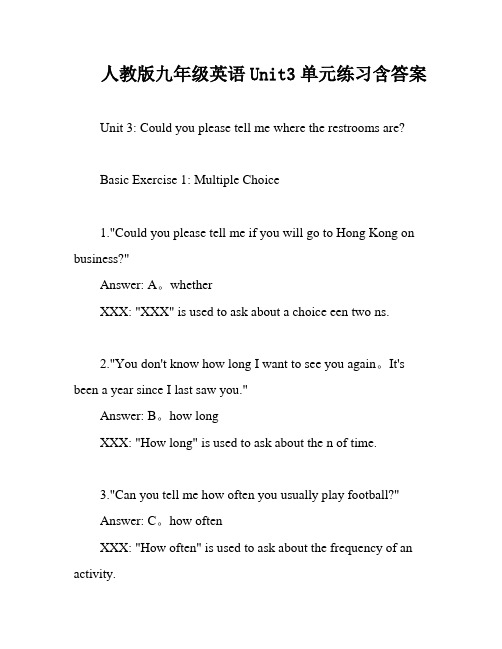
人教版九年级英语Unit3单元练习含答案Unit 3: Could you please tell me where the restrooms are?Basic Exercise 1: Multiple Choice1."Could you please tell me if you will go to Hong Kong on business?"Answer: A。
whetherXXX: "XXX" is used to ask about a choice een two ns.2."You don't know how long I want to see you again。
It's been a year since I last saw you."Answer: B。
how longXXX: "How long" is used to ask about the n of time.3."Can you tell me how often you usually play football?"Answer: C。
how oftenXXX: "How often" is used to ask about the frequency of an activity.4."Lily said she will buy a new piano the next day."Answer: B。
will buyXXX: "Will buy" is used to talk about a future n.5."I want to know when we should arrive at the airport."Answer: A。
人教版九年级英语Unit3 Section A Grammar Focus(课文讲解+练习)

— Yesterday morning.
A. where they arrived
B. when they arrived in Beijing
C. when did they arrive in Beijing D. where did they arrive
A. where did you buy it
B. why did you buy it
C. where you bought it
D. why you bought it
语法专练
单项填空。
1 Could you say it again? I can’t understand ______ you are
Unit 3
Could you please tell me where the restrooms are?
Grammar Focus
疑问词引导的宾语从句
语法讲解
1 当宾语从句由特殊疑问句充当时,用who, what, whom, whose, which, when, where, why, how等作为引导词。如: What did Mary say? I want to know. → I want to know what Mary said. 我想知道玛丽说了什么。 How many hours does a teenager need to sleep every day? Do you know? → Do you know how many hours a teenager needs to sleep every day? 你知道一个青少年每天需要睡多少小时吗? Why is eating too much salt bad for us? Can you tell me? → Can you tell me why eating too much salt is bad for us? 你能告诉我为什么吃太多盐对我们有害吗?
九年级英语全册 Unit 3 Could you please tell me where the restrooms are语法归纳与练习讲义 (新版)人
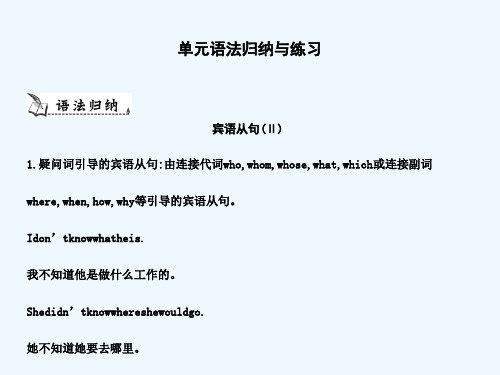
( C )2.—Excuse me,do you know
?
—On foot.(2017青岛)
A.what Alice came to do
B.where Alice came from
C.how Alice came here
D.who Alice came with
Hale Waihona Puke ( C )3.—Judy,could you tell me
A.spend B.take
C.cost D.pay
易错提醒: 1.宾语从句要用陈述句语序。由答语by air可知问句询问的是行为方式。 2.spend,take,cost,pay都有“花费”之意,然而cost的主语一般为事物,pay与
for连用构成短语:pay for;take 的主语为形式主语it;spend 的主语是人。
单元语法归纳与练习
宾语从句(Ⅱ) 1.疑问词引导的宾语从句:由连接代词who,whom,whose,what,which或连接副词 where,when,how,why等引导的宾语从句。 Idon’tknowwhatheis. 我不知道他是做什么工作的。 Shedidn’tknowwhereshewouldgo. 她不知道她要去哪里。
( A )5.—What did Paul say to you just now,John?
—He asked
.(2017丹东)
A.if I could go to the movie with him this evening
B.where I go today
C.who did I go shopping with yesterday
Unit3单词讲解及练习人教版九年级英语全册

第三单元单词讲解1.restroom n. (美)洗手间;公共厕所2.Washroom n. 洗手间;厕所3.Bathroom n. 浴室;洗手间4.Stamp 邮票;印章stamp collection集邮5.Bookstore n. 书店6.Beside prep. 在...旁边=by beside the lake=by the lake在湖的旁边7.Besides prep. 除...之外(还有)... Li Ming went home besides me. 除了我之外,李明也回家了。
8.Postcard n. 明信片9.Pardon v. 原谅;intery. 请再说一遍10.Pardon me 抱歉;对不起;什么;请再说一遍11.Normal adj. 普遍的;一般的;正常的normally adv.通常;正常情况下12.Rush v./n.仓促;急促rush to do sth.匆忙干某事rush into冲进in a rush匆忙地13.Suggest v.建议;提议suggestion n. 建议;提议(可数)some suggestions一些建议Suggest (one’s) doing sth.建议(某人)干某事14.advise v. 建议advice n. 建议(不可数名词)Advise sb to do sth.建议某人干某事some advice一些建议15.pass by=walk by=go by=go past=walk past 路过;经过16.Staff n. 管理人员;职工指“工作人员”总称时。
是集合名词,不用变复数,本来就是复数;也可强调个别成员,作主语是单三,也可变成复数。
17.Clerk n.职员(可数)18.Grape n. 葡萄19.Centre/center n. 中心;中央central adj.中心的;中央的the centre of... ...的中心20.Nearby adj.附近的;邻近的;adv.在附近;附近= near here/around here/in the neighborhood21.mail v. 邮寄;发电子邮件n. 邮件;信件Email sb at+邮箱地址给某人发邮件22.East 东south 南west 西north北方位名词加后缀+ern 变成形容词23.fascinating adj.迷人的;极有吸引力的24.Expensive adj. 昂贵的否定词inexpensive 不昂贵的25.Crowd v.拥挤n. 群众;人群crowded adj.拥挤的be crowded with...挤满...26.Uncrowded 不拥挤的;人少的27.Convenient adj. Convenience 便利;方便inconvenient 不便利的Be convenient to do sth干某事是便利的28.mall n. 商场;购物中心in the mall在商场29.Corner n. 拐角;角落at the corner在拐角处in the corner在拐角里on the corner在拐角上30.polite adj.礼貌的be polite to sb对某人有礼貌politely adv.礼貌地more polite31.Impolite adj.没有礼貌的;粗鲁的32.Request n./v.要求;请求request sb to do sth要求某人干某事request sth from sb向某人要求某物request for sth要求某事make requests提出要求33.Direct v.指向direction n. 方向;方位in the direction of...朝着...的方向director导演Adj.直接的;直率的directly adv.直接地;直率地34.Correct adj.正确的;恰当的correctly adv. 恰当地;适当地=properly35.Speak n. 说;讲speaker 发言者36.Who 谁whom谁(宾格)做宾语时用37.Address n.住址;地址;通讯处What’s your address?你的地址是什么38.Underground adj.地下的n. 地铁39.Parking lot 停车场;停车区40.Course n.课程;学科41.Italy 意大利Italian 意大利(人)的;意大利人;意大利语第三单元单词讲解练习1._____________ n.洗手间;公共厕所2.____________ 邮票;印章____________集邮3.____________ n. 书店4.____________ prep. 在...旁边=by ____________在湖的旁边5.____________ prep. 除...之外(还有)... ____________ 除…之外6.____________ n. 明信片7.____________ 抱歉;对不起;什么;请再说一遍8.____________ adj. 普遍的;一般的;正常的____________ adv.通常;正常情况下9.____________ v./n.仓促;急促10.____________ v.建议;提议____________ n. 建议;提议(可数)____________一些建议____________建议干某事11.____________ v. 建议____________ n. 建议(不可数名词)____________建议某人干某事____________一些建议12.____________ 路过;经过13.____________ n. 管理人员;职工指“工作人员”总称时。
九年级英语上册 Unit 3教案和练习 冀教版
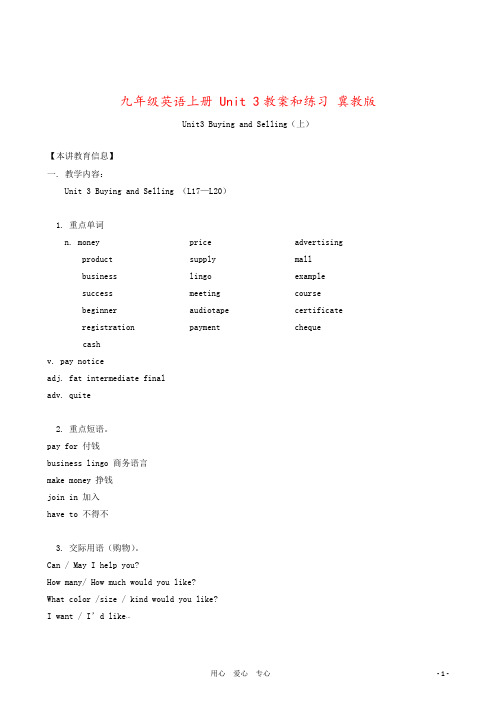
九年级英语上册 Unit 3教案和练习冀教版Unit3 Buying and Selling(上)【本讲教育信息】一. 教学内容:Unit 3 Buying and Selling (L17—L20)1. 重点单词n. money price advertising product supply mallbusiness lingo examplesuccess meeting coursebeginner audiotape certificateregistration payment chequecashv. pay noticeadj. fat intermediate finaladv. quite2. 重点短语。
pay for 付钱business lingo 商务语言make money 挣钱join in 加入have to 不得不3. 交际用语(购物)。
Can / May I help you?How many/ How much would you like?What color /size / kind would you like?I want / I’d like…How much is it?That’s too expensive. I’m afraidDo you have another color/size?That’s fine, I’ll take it.二. 重点、难点解析及词语辨析:1. Our basketball team has been invited to another city. 我们的篮球队已经被邀请到另一个城市去比赛。
(L17)invite 意思是“邀请”,固定搭配有: invite sb. to do sth. 邀请某人做某事invite sb. to someplace 邀请某人到某地去①I invite all my friend to my birthday party.我邀请了我全部的朋友来我的生日聚会。
人教版九年级全册英语Unit3 SectionA 知识讲解+专题练习学案(含答案)

Unit3 SectionA知识讲解1. a pair of 一双、一幅、一对a pair of用来表示"一对""一双""一副"等概念,常用于相同的两样东西成对出现或分为两个部分又彼此连接的物体名词前,该名词要用复数形式。
2. Excuse me, could you please tell me how to get to the bookstore? 打扰一下,你能告诉我到书店怎么走吗?(1)本句是问路或问处所的常用句型,此处excuse me用以礼貌地引起他人的注意,也表示尊重对方。
(2)Could you please...?意为"请你……好吗?",用于有礼貌地提出请求,语气较委婉,其后跟动词原形。
若是肯定回答Sure./Certainly./With pleasure./No problem.等;若是否定回答则用No, I can’t./I’m afraid not.等。
3. go pastgo past意为"经过,路过",相当于pass。
其中past为介词,意为"从……旁边过去"。
(1)past用作介词,还表示"(时间)超过;晚于"。
(2)past用作副词,意为"经过,过去"。
(3)past用作形容词,意为"过去的"。
4. suggest v.建议;提议suggest sth. (to sb.)(向某人)提议/建议某事suggest doing sth. 建议做某事suggest + that引导的宾语从句建议……此时宾语从句要用虚拟语气,谓语动词用(should)+ 动词原形suggest的名词形式为suggestion,意为"建议;提议"。
5. on one’s way to…意为"在某人去……的路上"。
by the way顺便说一下;顺便问一下in a way在某种程度上lose one’s way 迷路in the way挡路;妨碍(某人)in this way这样;通过这种方法专题练习一、单项选择1.Can you please tell me where ________ the post office?A.to find B.can I find C.how to find2.— I hear we’ll have a new English teacher this term.— Really? Do you know ______?A.what subject he teaches B.where he comes fromC.if he is a math teacher D.why he teaches so well3.________, which is the nearest way to Hill Building?A.Sorry B.Hello C.Excuse me D.Thank you 4.Could you tell me ________?A.where can I put the bicycle B.where could I put the bicycle C.where I can put the bicycle D.where I could put the bicycle5.We are all excited ________ the good news.A.listen to B.hear C.to listen to D.to hear二、完型填空A couple from Russia was once visiting Miami. They wanted to take a walk and to see the city, but they were 6 they might get lost. They did not speak any English.After they left their hotel, they went to the first street corner and 7 the name of the street. Then they carefully copied the name into their 8 . They thought that this would help them find their way back 9 they got lost.They walked for hours through the city, and suddenly they 10 that they were lost. They found a police officer and asked for 11 , but the officer didn’t speak their native language. They couldn’t 12 each other.After an hour they found a person who could help them. She was an interpreter(口译译员) who spoke both their native language and 13 . They explained that they didn’t know the name of their hotel, but they knew which corner it was on. They showed the interpreter what they had copied into their notebook, and the interpreter began to 14 .The words which they had so carefully copied 15 “one way street”. 6.A.sure B.afraid C.surprised D.careful 7.A.looked at B.wrote down C.talked about D.put up 8.A.bag B.phone C.notebook D.computer 9.A.unless B.if C.because D.whether10.A.decided B.understood C.realized D.wondered 11.A.money B.address C.help D.paper 12.A.understand B.teach C.learn D.control 13.A.Russian B.English C.French D.Chinese 14.A.point B.cry C.shout D.laugh 15.A.is B.were C.was D.are三、阅读单选Every English learner needs to know how to ask for something in English. There are a number of ways to do this. If you know someone has something, you can ask for it with a polite question. If you don’t know, it’s possible to ask for something with a yes or no question. Be careful not to use the direct expressions. In other words, don’t say “Give me that”, but ask kindly as the following examples, “Do you have a pen I could borrow?” “Is there any wine?” “Did you buy any bread?”If you know or see someone has something, ask a polite question with “could”, “may” or “might”. It’s also possible to use “can” in some special situations. In the past, “can” was not used when people asked for something, but meant ability. In the UK, people mainly use “Can you lend me…?” or “Can I have…?” In the US, this is still considered to be wrong and “May I have…?” is preferred.It’s common to use “Could you lend/hand/give…?” You can also use: “May/Can I borrow…?” “Could/Can you lend me…?” “May I have…?” “Could you hand/give me…?” Do not begin a sentence with “please”, but you can add “please” at the end of the sentence to be polite.16.What can we ask if we know someone has something?A.A direct question.B.A no question.C.A yes question.D.A polite question.17.What can Lucy say politely if she wants some coffee?A.Pass me some coffee.B.Is there any coffee?C.Give me some coffee.D.Take some coffee to me.18.What didn’t people say when they wanted something politely in the past?A.Can I use your dictionary?B.Could you lend me your bike?C.May I try your computer now?D.Might I take your car today?19.Which of the following is a correct polite expression according to the passage? A.Do you give me any milk, please?B.Please could you lend me your ruler?C.May I have some tea, please?D.Please could you hand me a knife?20.What’s the main idea of the passage?A.How to express or ask politely.B.What to do when we are polite.C.How to describe our ideas.D.What to do with our language problems.四、用所给单词的正确形式填空用括号内所给单词的适当形式填空21.Many people are exercising in __________(center)Park.22.Could you please __________(turn)down the radio?23.Tom __________(do)come early yesterday.24.He has finished __________(mail)a letter.25.This kind of animal __________(normal)comes out at night.五、完成句子26.这次考试他比上次考得甚至更好。
译林版英语九年级上册Unit3讲解及练习1

九上Unit 3(1)Name__________【知识回顾】Welcome to the unit1.mad的用法mad是形容词,意为“发疯的;生气的”。
drive sb mad使某人发疯/狂,mad在这里做宾补。
根据汉语意思完成句子1).工厂的噪音甚至使人发狂。
The noise in the factory even _____ ______ ________.2. lonely的用法lonely用做形容词,意为“孤独的,寂寞的,表示人内心的一种感觉。
alone不能作定语,意为“单独,独自”,不带感情色彩。
alone做副词时,含义相当于by oneself.选用lonely或alone填空2).He was _______in the classroom·3).They took him to a ________ house.4).Now he was old, he felt very _________.Reading3. choice的用法choice是名词,意为“选择,挑选”,have no choice but to do…意为“别无选择,只能做……”。
choose是choice的动词形式,意为“选择”,后面可以跟名词、代词或动词不定式。
根据汉语意思完成句子1).我除了请求老师的帮助别无选择。
I had_______ ________ _______ _________ ask for my teacher’s help.2).(扬州中考)Whatever your __________ is,I will just follow you.(选择)4.accept的用法accept意为“接受”,为及物动词,和refuse的意思相反。
accept和receive都有“收到”的意思,其区别是:receive仅客观上的“收到,接到”;而accept除了表示“收到”,还强调主观上的“接受,领受”。
Unit3重点知识语法讲解牛津译林版九年级英语下册
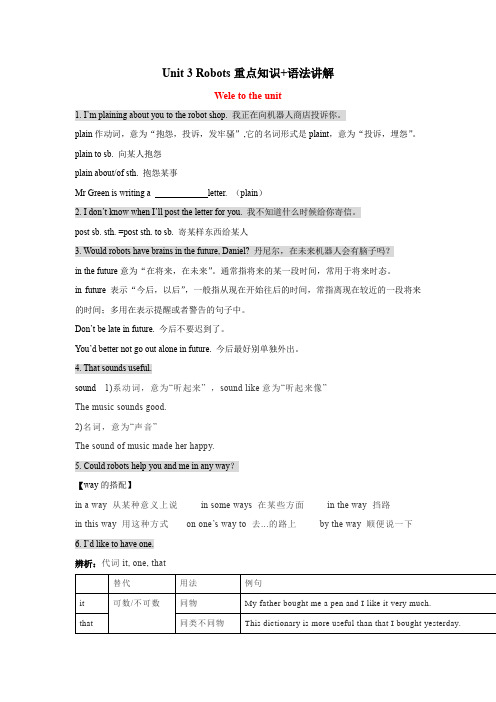
Unit 3 Robots重点知识+语法讲解Wele to the unit1. I’m plaining about you to the robot shop. 我正在向机器人商店投诉你。
plain作动词,意为“抱怨,投诉,发牢骚”,它的名词形式是plaint,意为“投诉,埋怨”。
plain to sb. 向某人抱怨plain about/of sth. 抱怨某事Mr Green is writing a letter. (plain)2. I don’t know when I’ll post the letter for you. 我不知道什么时候给你寄信。
post sb. sth. =post sth. to sb. 寄某样东西给某人3. Would robots have brains in the future, Daniel? 丹尼尔,在未来机器人会有脑子吗?in the future意为“在将来,在未来”。
通常指将来的某一段时间,常用于将来时态。
in future 表示“今后,以后”,一般指从现在开始往后的时间,常指离现在较近的一段将来的时间;多用在表示提醒或者警告的句子中。
Don’t be late in future. 今后不要迟到了。
You’d better not go out alone in future. 今后最好别单独外出。
4. That sounds useful.sound 1)系动词,意为“听起来” ,sound like意为“听起来像”The music sounds good.2)名词,意为“声音”The sound of music made her happy.5. Could robots help you and me in any way?【way的搭配】in a way 从某种意义上说in some ways 在某些方面in the way 挡路in this way 用这种方式on one’s way to 去...的路上by the way 顺便说一下6. I’d like to have one.Reading1. He is always too busy to have any time to relax. 他总是忙得没有时间放松。
- 1、下载文档前请自行甄别文档内容的完整性,平台不提供额外的编辑、内容补充、找答案等附加服务。
- 2、"仅部分预览"的文档,不可在线预览部分如存在完整性等问题,可反馈申请退款(可完整预览的文档不适用该条件!)。
- 3、如文档侵犯您的权益,请联系客服反馈,我们会尽快为您处理(人工客服工作时间:9:00-18:30)。
Unit 3: 复习资料+练习题【重点短语】take the test 参加考试pass the test 通过考试fail a test 考试失败be strict with+人对某人严格be strict in+事物对某事要求严格stay up 熬夜clean up 打扫整理learn from each other 互相学习concentrate on 专注于one’s own 某人自己的the other day 前几天,几天前= a few days ago have an opportunity to do sth.有机会做某事=have a chance to do/ of doingevery other day每隔一天(每两天)= every two daysat present 现在,目前in this way 用这种方法in the way 挡道的,妨碍人的on the way 在路上on one’s way to 在某人去…的路上by the way 顺便说(问)be serious about 对…认真care for在乎、关心【语言点】1. Teenagers should be allowed to choose their own clothes.应该允许青少年选择自己的衣服。
allow允许allow + n. 允许某事如:我们不允许这样的事(发生)allow sb. to do sth. 允许某人做某事(主动语态)如:妈妈允许我每晚看电视。
allow doing sth. 允许做某事如:They don't allow smoking here.be allowed to do sth. 被允许做某事(被动语态)如:莉莉被允许去青岛。
2.I don’t think sixteen-year-olds should be allowed to drive.宾语从句中否定转移:若宾语从句跟在think, believe等表示“想,认为"的动词之后,而主语为第一人称时,句子的否定体现在主句上。
常用词有:suppose(猜想), guess(猜、猜测), imagine(想象), expect(期待)如:我认为他不对我认为那不是一个好主意。
3.Sixteen-year-olds should be allowed to get their ears pierced.16岁的青少年应该被允许打耳洞。
V. + 宾语+ 宾补get/have + 宾语 + 过去分词请或让某人做某事如:I get my car . == I have my car . 我让别人修好我的车I want to have my hair . 我要理发.I usually get my hair cut once a month.我通常一个月理一次发。
keep sb/ sth. +形容词使某人/某物保持….如:We should keep our city clean. 我们应该保持我们的城市干净。
Don’t keep me for a long time.别让我等得太久。
4. They aren’t serious enough.他们不够严肃。
enough 足够形容词+enough 如:beautiful enough足够漂亮She is old enough to go to school. enough+名词如:enough food 足够食物I have enough money to go to Beijing. enough to do sth.足够…去做…如:She is old enough to go to school.5. He should stop wearing that silly earring.他应该停止戴那个愚蠢的耳环。
stop 停止、阻止stop doing sth. 停止做某事如:Please stop speaking.stop to do sth.停止下来去做某事如:Please stop to speak.can’t stop doing sth. 忍不住做某事如:I can’t stop laughing when I heard it.6. Sb. seems to do sth. = It seems that +从句看起来好像…He seems to feel very sad. = It seems that he feels very sad. 他看起来好像很伤心。
He doesn’t seem to have many friends.=It seems that he doesn’t have many friends.=He seems not to have many friends.7. 程度副词:always, usually, sometimes, never等如:I am always/usually/sometimes/never late for school. 我总是/经常/有时/从不上学迟到。
8. ---We have a lot of rules at my house. 在家里我们有许多规定。
---So do we. 我们也是。
(倒装句)so + be/ 助动词 / 情态动词+ 主语表示前面所叙述的肯定情况也适合于后者,所叙述的不是同一人或物。
“……也是如此”neither(nor)+ be/ 助动词/情态动词 + 主语表示前面所叙述的否定情况也适合于后者,所叙述的不是同一人或物。
“……也不”如:Tom has been to Beijing. So have I.--- He speaks English well.--- So he does. / --- So do you.He can’t swim. Neither/ Nor can I.9. go doing go shopping(去购物) go fishing(去钓鱼) go swimming(去游泳),go boating(去划船) go hiking(去登山) go trekking(去徒步) 10. caretake care 留神,小心=be careful,保重Take care not to drop it.当心别把它掉了。
take care of 照顾,照料=look after 如:I took care of my sister well.care about关心,在乎如:That girl never cares about others.care for 喜欢,照顾,为……操心如:You should care for your sick mother.11. 对… 热衷,对…兴趣be serious about doing 如:She is serious about dancing. 她对跳舞热衷。
sth. 如:She is serious about him. 她对他感兴趣。
12. sleep n./v. 睡觉I sleep for 7 hours every day.asleep adj.睡着的,睡熟的表状态不能在名词之前She is asleep in the bed.sleepy adj. 想睡觉的,困乏的I'm sleepy, I want to go to bed.sleeping adj.睡着的,正在睡觉的在名词之前This is a sleeping dog.13. agree to + 建议、计划、安排等名词agree with + 人、表示意见的词agree on + 具体协议的文件、行动等名词agree to do 同意做某事14. have +时间段+off 放假,休息如:have 2 days off off 不工作,不上班,不上学,不值班.例: I think I’ll take the afternoon off. 我想下午歇班. She is off today. 她今天休息.I have three days off next week. 下周我有三天假.They haven’t had a day off since last week. 从上周来,他们没休息过一天.【重点语法】1.被动语态①英语有两种语态:主动语态和被动语态主动语态表示是动作的执行者被动语态表示主语是动作的承受者Cats eat fish. (主动语态)猫吃鱼。
Fish is eaten by cats.(被动语态)鱼被猫吃。
②被动语态的构成:由“助动词be +及物动词的过去分词”构成助动词be 有人称、数和时态的变化,其变化规则与be 作为连系动词时完全一样。
时态被动语态结构例句一般现在时amare +过去分词isEnglish is spoken in many countries.一般过去时was +过去分词were + 过去分词This bridge was built in 1989.情态动词can/shouldmay +be+过去分词must/……The work must be done right now.2. 倒装句由so+助动词(be/do/will/have)/情态动词+主语意为:…也是一样Neither/Nor + be动词/助动词/情态动词+主语(前为否定) 表示与前面所述事实一致.She is a student. So am I.她是一个学生,我也是。
She went to school just now. So did I. 她刚才去学校了,我也是。
She has finished the work. So have I. 她已经完成了工作,我也完成了。
She will go to school. So will he.她将去学校,他也是。
Tom can’t swim. Neither can John.练习题( ) 1. ---Look at the sign on the right.---Oh, smoking here.A. doesn’t allowB. isn’t allowedC. didn’t allowD. wasn’t allowed( ) 2. If people cutting down the forest, they will have nowhere .A. keep, to live inB. will keep, to live inC. keep, to liveD. will keep, to live( ) 3.Lucy speaks English . She can talk to the guests from the USA.A. enough goodB. enough wellC. good enoughD. well enough( ) 4. Mr. Black, can you tell me the best way a foreign language?A. learnB. learningC. of learnD. to learn( ) 5. It's very hot in the room. Would you please keep the window .A. openB. opensC. to openD. close( ) 6. James, I’m too tired. Let’s stop a rest .A. havingB. haveC. to havingD. to have( )7. Can we agree a date for the next meeting?A. toB. onC. withD. of( )8. The twins are good at . They are both in the club.A. run, runB. runs, runningC. run, ranD. running, running( ) 9. We don't agree them, but we agree the plan.A. with, withB. to, toC. with, toD. to, with( )10. Tom agreed friends with me.A. makeB. makesC. makingD. to make()11. I don’t your opinion.A. care aboutB. care forC. take care ofD. take care()12. when you cross the road.A. Care aboutB. Care forC. Take care ofD. Take care()13.---I have read the book before. ---Me, too. (选出与划线部分意思相同的一项)A. We are the sameB. So have IC. Also ID. Neither have I课后练习【单项选择】( ) 1.—Jim enjoys listening to pop music.— .A. So does Helen.B. Also is HelenC. Helen likes alsoD. So Helen does ( ) 2. Our English teacher is very strict _______ us and he is strict _________his teaching.A. with, atB. with, withC. at, atD. with, in( ) 3. —What’s the matter?—They said I should not be allowed here. They don’t allow __in the waiting room.A. smoking, to smokeB. to smoke, smokeC. to smoke, smokingD. smoking, smoking( ) 4. He doesn’t do his homework ______________, though he has ______________.A. carefully enough, enough timeB. enough carelessly, time enoughC. carelessly enough, enough timeD. enough carefully,enough time( ) 5. The little child was too _____________ to hear the end of the long speech.A. sleepyB. asleepC. sleepD. sleeping( ) 6. Everyone ____________to have at least eight__________sleep at night.A. needs, hour’sB. need, hours’C. needed, hour’sD. needs, hours’( ) 7. We should go to school at 8:00 ______________ school mornings.A. atB. inC. onD. of( ) 8. Something is wrong with my PDA.I will get it ___________ .A. repairB. repairingC. to repairD. repaired( ) 9. ——Excuse me, you are _________ of my passing through.——I’m sorry, here you go.A. on the wayB. in the wayC. out the wayD. off the way ( ) 10. Jill didn’t finish the homework,_________.A. eitherB. tooC. alsoD. neither( ) 11. You must concentrate more _________ your English.A. toB. inC. onD. at( ) 12. That is a good way to keep _________ teachers and students happy.A. eitherB. noneC. allD. both ( ) 13. Don’t get_________ when you study in groups.A. noiseB. noisesC. noisyD. noising ( ) 14. We should learn _________ each other.A. toB. fromC. forD. of( ) 15. The children often take time to do things like_________.A. volunteerB. to volunteerC. volunteersD. volunteering【用所给词适当形式填空】1. People are not ( allow) to smoke in some public places.2. My parents didn’t use to allow (watch) TV on weekdays.But I was (watch) TV on Sundays.3. Our TV doesn’t work at all. I am going to get it (repair).4. When did you get your hair (cut).5. He got me (help) him.【句型转换】1. Teenagers should be allowed to wear that earring.(否定句)Teenagers to wear that earring.2. He should allow you to make your own decision. (被动语态)You should to make your own decision.【翻译句子】1.学生们应该被允许用电脑来做家庭作业。
